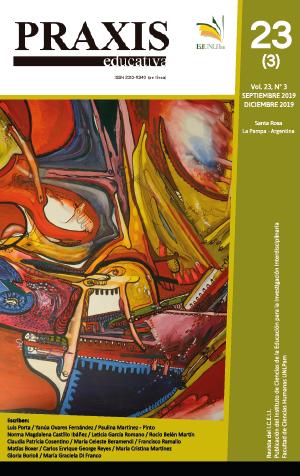Tres (re)inscripciones performativas: dislocar la pedagogía, expandir la docencia e interrumpir el dolor social / Three performative (re) inscriptions: to dislocate pedagogy, to expand teaching and to stop social pain
DOI:
https://doi.org/10.19137/praxiseducativa-2019-230308Palavras-chave:
ciencia, docencia, dolor social, investigación narrativa, PedagogíaResumo
En Argentina, durante el año 2018, en diferentes universidades, institutos y escuelas emergieron punzantes interrupciones en defensa de la educación pública –laica y gratuita–. Devienen de ellas, en este texto,tres (re)inscripciones performativas que indagan las categorías –o narrativas, como preferimos llamarlas– que compartimos en la producción científica de nuestra comunidad académica –el Grupo de Investigaciones en Educación y Estudios Culturales de la Universidad Nacional de Mar del Plata–. Entonces, al calor de nuestras propias interrupciones y con la capacidad institucional y públicamente legitimada de producir conocimientos en el campo de las Ciencias de la Educación, enunciamos aquí tres (re)inscripciones performativas: dislocar la pedagogía, expandir la docencia e interrumpir el dolor social. Para ello, recuperamos la urgencia de un desalojo epistémico de nuestra (auto)arrogancia y restauramos una primera persona como condición de una convivencia más amable con todas las vidas.Downloads
Referências
Arfuch, L. (2013).Memoria y autobiografía: exploraciones en los límites. Buenos Aires: Fondo de Cultura Económica.
Báez, J. y Fainsod, P. (2018).¡Qué sea ley! Excusas, paradojas y desafíos de la Educación Sexual Integral (ESI). Buenos Aires: Observatorio Participativo de Políticas Públicas en Educación, Facultad de Filosofía y Letras de la Universidad de Buenos Aires.
Butler, J. (2015).Cuerpos que importan. Sobre los límites materiales y discursivos del ‘sexo’. Buenos Aires: Paidós.
Flores, V. (2017).Interruqciones: Ensayos de poética activista, Escritura, política, pedagogía. Córdoba: Asentamiento Fernseh.
Giroux, H. (2018). Por qué importan los docentes en tiempos oscuros. Revista de Educación, Facultad de Humanidades, (13), 13-19. Recuperado de:https://fh.mdp.edu.ar/revistas/index.php/r_educ/article/view/2735/2715
Greco, M. B. (2015).La autoridad pedagógica en cuestión. Una crítica al concepto de autoridad en tiempos de transformación. Buenos Aires: Homo Sapiens.
Halberstam, J. (2011).El arte queer del fracaso. Madrid:Egales.
Hartnett, S. y Engels, J. (2017).Aria en tiempos de guerra: la poesía investigativa y la política del testimonio. EnDenzin, N. y Lincoln, Y. (comp.), El arte y la práctica de la interpretación, la evaluación y la presentación. Gedisa: Barcelona.
Mariposas Mirabal. (2018).Doce años de la Ley de Educación Sexual Integral. Las políticas, el movimiento pedagógico y el discurso anti ESI recargado. Buenos Aires:Observatorio Participativo de Políticas Públicas en Educación, Facultad de Filosofía y Letras de la Universidad de Buenos Aires.
Mbembe, A. (2018).Necropolítica: Biopoder, soberania, estado de exceção, política da morte. São Paulo: n-1edições.
Merodo, A. (2017). De las dificultades de construir una “voz propia” en educación. Revista Páginas, 12(8) ,1-11.
Porta, L. (Director). (2018).Despegar la imagen del espejo: Exploraciones sensibles de la reforma universitaria del ’18. Mar del Plata: EUDEM.
Porta, L. y Yedaide, M. (Comp.). (2017).Pedagogía(s) vital(es): Cartografías del pensamiento y gestos ético-políticos en perspectiva descolonial. Mar del Plata: EUDEM.
Ramallo, F. (2018).¿Qué pasado narrar en la educación? Gestos descoloniales en la historia del bachillerato argentino. Revista Palobra, (18),234-247.
Ranciére, J. (2006).El maestro ignorante: cinco lecciones sobre la emancipación intelectual.Buenos Aires: Tierra del Sur.
Salomón, S. (2014). La traducción como performance: lenguajes, creatividad y construcción. RECIAL: Revista del Ciffyh Área Letras, 5(5-6).
Segato, R. (2017).La guerra contra las mujeres. Buenos Aires: Traficantes de sueños.
Sontag, S. (2003).Ante el dolor de los demás. Madrid: Alfaguara.
Valença Alves, K. (2018).A guerra como uma forma não convencional de violencia. Material da Linha de pesquisa em Subjetividades Coletivas, MovimentosSociais e Educação Popular. Recife:Universidade Federal de Pernambuco.
Walsh, C. (2013). Pedagogías descoloniales: Prácticas insurgentes de resistir, (re) existir y (re) vivir. Quito: Serie Pensamiento descolonial.
Yedaide, M. (2017). El relato “oficial” y los “otros” relatos sobre la enseñanza en la formación del Profesorado. Un estudio interpretativo en la Facultad de Humanidades, UNMDP (tesis doctoral en Humanidades y Artes, mención Educación). Universidad Nacional de Rosario (inédita).
Yedaide, M. (2018). “Procesos de (re)composición narrativa en la investigación educativa”. 4º Jornadas de Investigadores, Grupos y Proyectos en Educación. Mar del Plata, UNMdP, pp. 229-240.
Yedaide, M., Álvarez, Z. y Porta, L. (2015). La investigación narrativa como moción epistémico-política.Revista Científica Guillermo de Ockham, 13(1), 27-35.
Yedaide, M., Aguirre, J., Ramallo, F. y Porta, L. (2018).Exploraciones con vocación performativa: viajes al sentido vivo de la reforma. En Porta, L. (coord) Despegar la imagen del espejo: Exploraciones sensibles de la reforma universitaria del ’18. Mar del Plata, EUDEM.
Downloads
Publicado
Edição
Seção
Licença
Aviso de direitos autorais
Comitê Editorial Revista Práxis Educativa:
Declaro que sou o autor do artigo intitulado (nome do artigo), que o mesmo é original e de minha autoria e que não foi publicado anteriormente em qualquer outro formato ou meio. Declaro saber que a revista não me cobrará nenhum tipo de taxa em hipótese alguma, nem receberei qualquer tipo de remuneração monetária.
Caso seja aceito para publicação na Práxis Educacional, autorizo a referida revista a publicá-lo digitalmente e a divulgá-lo em suas redes sociais.
Se o trabalho for publicado, aderi à licença Creative Commons denominada "Atribuição - Compartilhamento Não Comercial pela mesma Licença CC BY-NC-SA", por meio da qual é permitido copiar, reproduzir, distribuir, comunicar publicamente o trabalho e gerar trabalhos derivados , desde que o autor original seja citado e reconhecido. Esta licença está em uso desde setembro de 2018. Em 2016 foi aderido ao CC BY NC ND 4.0; e nos anos de 2017 e 2018 (janeiro-agosto) CC BY NC 4.0.
Esta licença CC BY-NC-SA Share Alike não permite, entretanto, o uso comercial da obra. Como autor, a revista poderá estabelecer acordos adicionais para a distribuição não exclusiva da versão do trabalho publicado na revista, permite-me autoarquivar os artigos publicados, na sua versão post-print, em repositórios institucionais, temáticos , páginas web pessoais ou qualquer outro uso relevante. com o reconhecimento de ter sido publicado pela primeira vez nesta revista.
SA Práxis Educacional adere à DORA (Declaração sobre Avaliação de Pesquisa) assinada em São Francisco, Califórnia, em 16 de dezembro de 2012, e à Declaração do México (Declaração Conjunta LATINDEX - REDALYC - CLACSO - IBICT).















_(1)2.png)


3.png)











_(2).png)






2.jpg)









